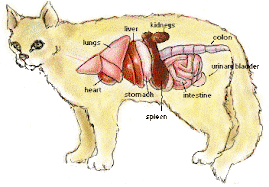Spaying or neutering your cat prevents unwanted births and reduces the influence of sex hormones on your pet's behavior. In seven years, an unspayed female and unneutered male cat can produce up to 781,250 kittens. Homes cannot be found for most of these animals and many either end up in shelters or on the street. Only a lucky few are adopted; the rest are either euthanized or die from trauma, exposure, starvation or disease. By spaying or neutering your cat, you do your part to prevent this tragedy.
Behavior problems can also be prevented or minimized by spaying or neutering your cat. Sexual behavior in both male and female cats is reduced following surgery. In 90% of male cats, neutering eliminated roaming, urine spraying, and fights with neighborhood cats, regardless of their age when neutered. Female cats no longer show "heat" behavior (soliciting mounting from males). Overall, being sexually intact increases the risk of relinquishment to a shelter. There are, however, large individual differences and not all cats undergo a behavior change following spaying or neutering.
Tuesday, October 9, 2007
WHY SPAY / NEUTER YOUR CAT
Posted by
THE ALLEY CAT FORUM
at
8:56 PM
![]()
Labels: CAT, CAT HEALTH, FELINE, FLEA, NEUTER, SPAY, VETERINARIAN
Wednesday, October 3, 2007
TAPEWORM IN YOUR CAT
Here is the short version of the tapeworm.
Tapeworms release muscular egg packets into the intestine. These egg packets are about 1/2 to 3/4th of an inch long when they first exit the rectum and are capable of movement. They wiggle around, spewing out tapeworm eggs until they use up all their energy stores. Then they dry up and look like rice granules stuck in the hair of the cat.
Tapeworms are carried by fleas and are not uncommon in indoor only cats, due to this. Good flea control will prevent recurrence after your cat is dewormed for the tapeworms he has now. There are safe and effective tapeworm medications available from your veterinarian. They are prescription products so your vet may need to see your cat prior to dispensing them if it has been a while since his last visit.
Posted by
THE ALLEY CAT FORUM
at
7:24 AM
![]()
Labels: CAT HEALTH, cat worms, FLEA, tapeworm, Tapeworms, worms in cats
FLEA LIFECYCLE
Even though flea season is ending we thought we would give you some information now so you will be prepared for next flea season.
Understanding the life cycle of the flea is necessary in order to control it. The flea has several stages to its life cycle. Adult fleas spend most of their time on the dog or cat - they must be dislodged to leave since they will not do so voluntarily. Despite this, when the flea population on the dog becomes excessive humans tend to be an acceptable alternative to the flea. The average life span of an adult flea is probably about 6 weeks - but fleas can live as long as a year under certain conditions. A female flea can lay 20 to 28 eggs a day. She may lay several hundred eggs over her life span. These eggs fall off the pet and develop where they land. They are small and can even develop in the cracks in wood floors or other small crevices. A larvae hatches from the flea egg. It takes as few as 9 days to as long as 200 days to go through its growth stages. At this time is forms a pupae and waits for the right time to hatch. Fleas prefer temperatures of 65 to 80 degrees and humidity of 75 to 85 per cent. This range determines the period of time that fleas are a problem in your particular area. For some areas of the country, this is all year. In others, the flea season is relatively short. It is estimated that for every adult flea found on the pet, there are about 10 developing fleas in the pet's environment.
Posted by
THE ALLEY CAT FORUM
at
6:42 AM
![]()
Labels: CAT, CAT HEALTH, CATS, COAT, FLEA, FLEAS, FUR, KLIBAN, VETERINARIAN



















 Custom
Custom 

